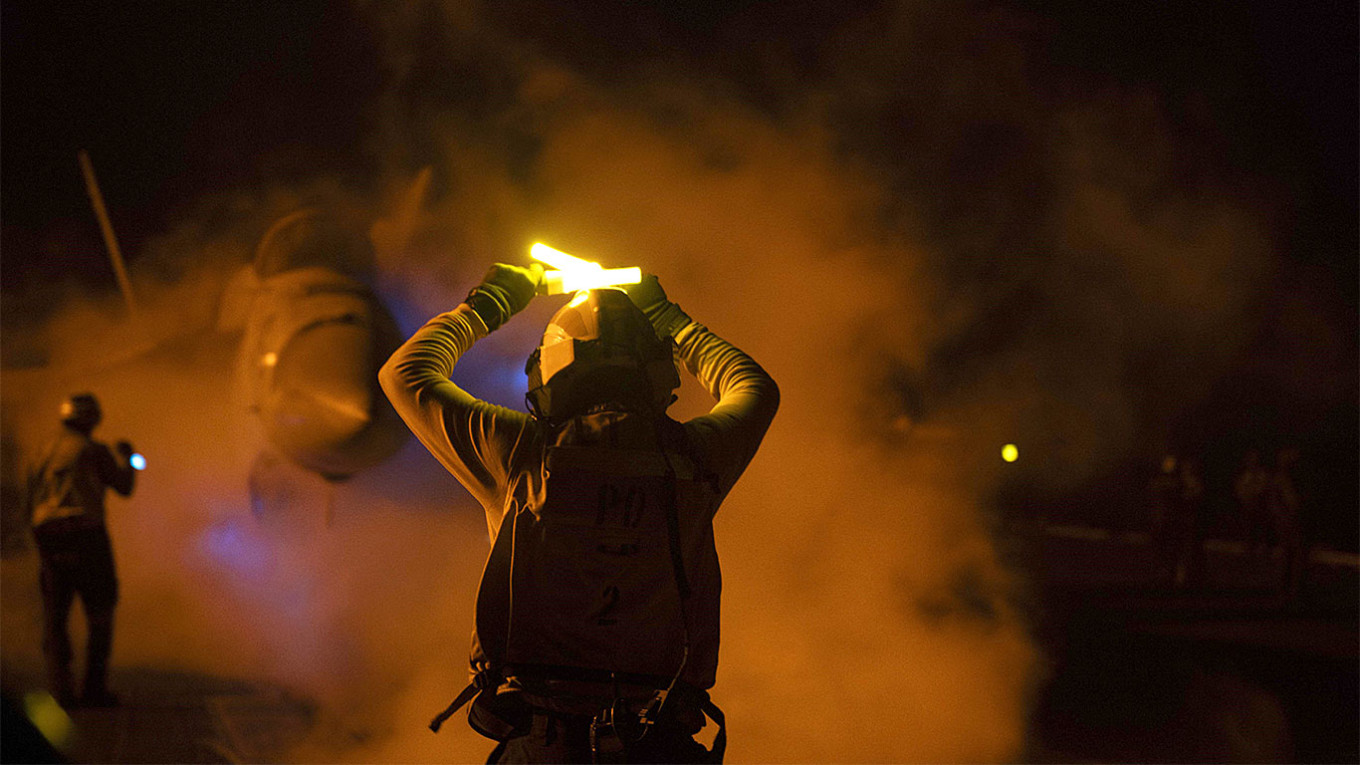Predictably, Russia has been deeply critical of strikes by the United States and the United Kingdom against Yemen’s Houthi militia, which had been attacking ships passing through the Red Sea. In reality, however, Moscow is likely not at all opposed to Washington restoring order in the Red Sea and ensuring maritime traffic can continue to use the Suez Canal: an important transit route for Russian oil bound for India.
Russian officials responded angrily to the news of the U.S. and U.K. attacks on the Houthis. President Vladimir Putin’s spokesman Dmitry Peskov said they were “illegitimate”; State Duma speaker Vyacheslav Volodin called for U.S. President Joe Biden to face criminal proceedings; and the Foreign Ministry requested an urgent UN Security Council meeting.
Indeed, it is difficult to imagine Moscow reacting in any other way. U.S.-Russian relations long ago became a zero sum game, which means every move by Washington is automatically condemned by Moscow. In addition, the Kremlin is using every opportunity to double down on its anti-colonial rhetoric, which it hopes will help it win the support of the Global South.
At least in public, Russian officials contend that the confrontation in the Red Sea is economically advantageous to it. Russia’s exports and imports largely pass through its Far East ports and railway links with China. No more than about 10% of its foreign trade goes through the Suez Canal and, in any case, that has not — so far — been affected.
Putin claimed that the Red Sea standoff could prompt shipping companies to switch to the Northern Sea Route that runs along Russia’s Arctic coast. Moscow has also used this moment to promote another alternative trade route: the North–South Transport Corridor connecting Russia to the Indian Ocean via Iran. According to nationalist politician Leonid Slutsky, this route could be “a new logistics infrastructure for Eurasia.”
In other words, Moscow’s rhetoric appears designed to frame events in the Red Sea as just another example of how it is benefitting from fracturing U.S. hegemony. Russia’s actions, however, are far more revealing. Moscow has done nothing to stop the United States from taking military action — despite having some power to do so. Washington set up a coalition against the Houthis on Dec. 18 last year. Even before the strikes on Yemen itself, that coalition had sunk three Houthi ships and shot down dozens of drones and rockets.
On Jan. 11, Washington put forward UN Resolution 2722 as a legal basis for attacks on Houthi infrastructure. Russia did not veto the resolution, which subsequently passed, and the United States and the U.K. carried out their first strikes on Yemen the following day.
Perhaps inevitably, Russia claimed the resolution was not a mandate for military action. Yet it is hard to believe that Russia did not guess this might be the outcome. It was obvious from the discussions about the resolution that military action was very much on the cards.
Further light is shone on Russia’s position by statements made by its officials at the UN that were critical of the Houthis. They included condemnation of the Houthis and calls for “free and secure maritime transit in the region.” Putin’s spokesman Peskov said that Russia had “repeatedly called on the Houthis to refrain from such actions and considers them to be wrong.”
The reality is that Moscow is concerned about its economic interests in the Red Sea. Of course, there is some truth to the argument that the current crisis could stimulate interest in the Northern Sea Route and the North–South Transport Corridor, but that would only happen in the long term. There has been no immediate difference in the volume of freight being sent via those routes.
Russia would, however, suffer from the closure of the Suez Canal. Most of Russia’s oil exports to India — currently the biggest importer of Russian hydrocarbons — are sent via the canal. That’s up to 3 million barrels of oil a day: about a third of Russia’s crude exports.
If the Suez Canal were closed, Russia would be forced to send its tankers all the way around Africa to reach India. Its fleet of tankers is not big enough to maintain current export volumes if that were to happen, and sourcing more would be no mean feat: tanker demand would be sky-high in such a scenario since Russia is not the only country transporting oil through the Suez Canal.
For now, the risks to Moscow’s oil exports from the Houthis are minimal. Indeed, Russia is the only country not to have reduced the amount of oil it sends through the Red Sea amid the ongoing military confrontation. It is possible Houthi fighters are deliberately avoiding targeting Russian ships: perhaps Moscow is passing the Houthis — via Iran — information about their tankers. Yet even if that is the case, it is hardly a foolproof system of protection from possible escalation. The Houthis did attack a tanker on Jan. 14 that was carrying Russian oil.
It seems clear, then, that Russia has little to gain from a flare-up in the Red Sea. For that reason, Washington’s efforts to solve the problem of Houthi attacks are likely to be quietly welcomed in Moscow. Of course, U.S.-Russian tensions mean the Kremlin can’t officially come out and say it supports U.S. military action. But it is very unlikely to get in the way.
This article was originally published by The Carnegie Endowment for International Peace.
A Message from The Moscow Times:
Dear readers,
We are facing unprecedented challenges. Russia's Prosecutor General's Office has designated The Moscow Times as an "undesirable" organization, criminalizing our work and putting our staff at risk of prosecution. This follows our earlier unjust labeling as a "foreign agent."
These actions are direct attempts to silence independent journalism in Russia. The authorities claim our work "discredits the decisions of the Russian leadership." We see things differently: we strive to provide accurate, unbiased reporting on Russia.
We, the journalists of The Moscow Times, refuse to be silenced. But to continue our work, we need your help.
Your support, no matter how small, makes a world of difference. If you can, please support us monthly starting from just $2. It's quick to set up, and every contribution makes a significant impact.
By supporting The Moscow Times, you're defending open, independent journalism in the face of repression. Thank you for standing with us.
Remind me later.








